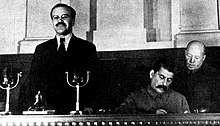
The 17th Congress of the All-Union Communist Party (Bolsheviks), popularly known as the Executed Congress (as the majority of those present at the Congress were arrested or executed during the Great Purge) was held from 26 January to 10 February 1934. The congress was attended by 1,225 delegates with a casting vote and 736 delegates with a consultative vote, representing 1,872,488 party members and 935,298 candidate members.
Events
During the elections to the 17th Central Committee Stalin received a significant number (over a hundred, although the precise number is unknown) of negative votes, whereas only three delegates crossed out the name of the increasingly popular, Stalin-aligned Leningrad party boss, Sergei Kirov. The results were subsequently covered up on Stalin's orders and it was officially reported that Stalin also received only three negative votes.
During the Congress a group of veteran party members approached Kirov with the suggestion that he replace Stalin as the party leader. Kirov declined the offer and reported the conversation to Stalin, as he was very much loyal to Stalin.
In public, Stalin was acclaimed, not merely as the leader of the party, but as a towering, universal genius in every human sphere. All his former opponents spoke approvingly of him (other than Leon Trotsky, who had been exiled in 1929), and pledged their total support to the party line.
In his speech to the 20th Party Congress, Nikita Khrushchev reported that "of the 139 members and candidates of the Central Committee who were elected at the 17th Congress, 98 persons, i.e., 70 per cent, were arrested and shot (mostly in 1937-1938)." In addition, Khrushchev said that "of 1,966 delegates with either voting or advisory rights, 1,108 persons were arrested on charges of anti-revolutionary crimes, i.e., decidedly more than a majority."
At the congress Rabkrin was dissolved and its functions passed to the Sovnarkom's People's Control Commission.
Agenda of the Congress
1. Reports by Stalin (Central Committee of the All-Union Communist Party (Bolsheviks)), Mikhail Vladimirsky (Central Revision Committee). Rudzutak and Manuilsky
2. Second five-year plan, speakers: Vyacheslav Molotov and Valerian Kuybyshev
3. Organizational issues (party and Soviet construction), speaker: Lazar Kaganovich
4. Elections to the central organs of the Party, the Central Committee, the Central Revision Committee, and the Party Control Commission.
List of Elected Members of the Central Committee
Main article: Central Committee elected by the 17th Congress of the All-Union Communist Party (Bolsheviks)Aftermath
On 1 December 1934, after the results of the 17th Party Congress, Sergei Kirov was shot and killed by Leonid Nikolaev. The assassination of Kirov following the Congress would be a bellwether for the Great Purge of 1937–1938, and some theorize that Stalin himself orchestrated Kirov's murder. While Kirov was loyal to Stalin, he was extremely popular, and a potential threat to Stalin's rule.
See also
References
- Seventeenth Congress of the CPSU (Bolshevik) in The Great Soviet Encyclopedia, 3rd Edition (1970-1979).
- Robert C. Tucker (1992). Stalin in Power: The Revolution from Above, 1928-1941. W. W. Norton & Company. p. 260. ISBN 978-0-393-30869-3.
- "Speech to 20th Congress of the C.P.S.U." www.marxists.org. Retrieved 23 May 2019.
- "XVII съезд ВКП(б)". www.hrono.info. Retrieved 23 May 2019.
- "Most Evil Men in History: Joseph Stalin". Youtube. Archived from the original on 21 December 2021.
- "Hitler and Stalin: Roots of Evil". Youtube.
- Armstrong, John A. 1961. The Politics of Totalitarianism: The Communist Party of the Soviet Union, 1934 to the Present. New York: Random House.
- Fitzpatrick, Sheila. 1994. The Russian Revolution, Second Edition. New York: Oxford University Press.
- "CONGRESS OF WINNERS Full Transcript" (in Russian). Retrieved 21 January 2012.
- Resolutions and Decisions, Including Party Rules adopted by the 17th Congress.
| Joseph Stalin | |||||
|---|---|---|---|---|---|
| History and politics |
| ||||
| Concepts |
| ||||
| Crimes, repressions, and controversies |
| ||||
| Works |
| ||||
| De-Stalinization | |||||
| Criticism and opposition | |||||
| Remembrance |
| ||||
| Cultural depictions | |||||
| Family |
| ||||
| Stalin's residences | |||||